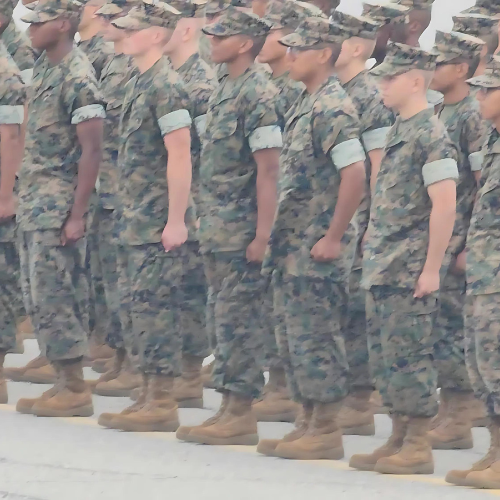
A Mother’s Journey: Watching My Son Become a U.S. Marine
This is a short series about the emotions, stress and anxiety I felt as my son became a U.S. Marine.
At 16, my son Jibrill announced he wanted to join the Army. At the time, I still believed this might be a passing phase. He had never been certain about his future, and even when some of his friends were starting summer jobs, he had no interest. "I won’t be here next summer, and I want to start training now so I can be ready for bootcamp the minute I graduate from high school."
Once he turned 17, I could see he wasn’t letting go of this dream, so I helped him find a recruiter. Over the next few months, Jibrill and I had numerous conversations. The hardest one was about the potential risks he would face, e.g., the possibility that he might not ever come back. My son looked at me with calm confidence and said, “I know what the risks are, and I still have no issue with joining.” Even though I wasn’t ready, he apparently was.

Giving him Consent Before the age of Consent.
So we gave our consent for him to sign up at 17. Jibrill entered the “Marines' Delayed Entry Program”, where his recruiter almost became a sort of third parent: He would schedule and take him to the appointments, check in on his social media, and would even show up at important events throughout the year. I watched as Jibrill committed to preparing for boot camp, and I started to see the depth of his determination.
The night before he left for bootcamp, Jibrill asked me for a Bible. That morning, I ran around town to find him a pocket-sized one. When I handed it to him, he said, “By the end of boot camp, I’m going to have this memorized.” In that moment, I fought back tears, knowing the very last chapter of his childhood was rapidly coming to a close. Nine days after his high school graduation, we dropped him at the recruiter’s office and said goodbye. (He hadn’t even turned 18.)
 The next night, at 1:06 a.m., we received a brief but unforgettable scripted phone call from Jibrill: “THIS IS RECRUIT BANKS. I HAVE ARRIVED SAFELY IN PARRIS ISLAND. PLEASE DO NOT SEND ANY FOOD OR BULKY ITEMS IN THE MAIL. I WILL REACH OUT TO YOU BY MAIL IN 7 TO 9 DAYS. THANK YOU FOR YOUR SUPPORT. GOODBYE FOR NOW.” His voice was so strong, so assured. The transition from childhood to manhood had already begun.
The next night, at 1:06 a.m., we received a brief but unforgettable scripted phone call from Jibrill: “THIS IS RECRUIT BANKS. I HAVE ARRIVED SAFELY IN PARRIS ISLAND. PLEASE DO NOT SEND ANY FOOD OR BULKY ITEMS IN THE MAIL. I WILL REACH OUT TO YOU BY MAIL IN 7 TO 9 DAYS. THANK YOU FOR YOUR SUPPORT. GOODBYE FOR NOW.” His voice was so strong, so assured. The transition from childhood to manhood had already begun.
Adjusting to His Absence
Jibrill’s journey to Parris Island was the first time he traveled out of state without me. I was glued to the tracking app Life360, watching his every move until his phone died at the last airport. So I joined a private Facebook group for other Marine parents to share in our collective excitement and worry and be kept up to date about what was going on in boot camp. I’ve always been level-headed, but in those early days, I found myself on an emotional roller coaster. Sometimes, I’d seek comfort by sitting in his empty room.
People compared it to sending kids off to college, but this was so different. There were no texts or FaceTime calls, just waiting for letters and hoping NOT to get a phone call even though I wanted one so badly. But any call would have been bad news: He didn’t pass a test, he was injured, or he had been hospitalized. The first letter back didn’t arrive until a month after he left. I was disappointed to see that it was a “scripted” letter, written by his drill instructor and in the envelope was an additional blank piece of paper on which he had simply written the date. I assumed he was just too tired to do anything more.
Waiting for more updates was nerve-wracking. I kept telling myself that no news was good news. Our Marine Parents support group became my new obsession. I was scouring it for any tidbits of information and interacting with other parents going through the same thing. Admins from MarineParents.com were guiding us through every step of boot camp and offering insight into the recruits' schedules. My brothers, who both worked in the military, assured me that Jibrill would be fine and that he was well-prepared.

Still, I worried constantly about his health and safety throughout the entire process. But what I worried about most was how he would react if he got injured and couldn’t achieve his dream of making it through the first 11-weeks of training without any setbacks. In next week’s installment I will write about what turned out to be the hardest part of all.




Rebecca de Jesus
Author